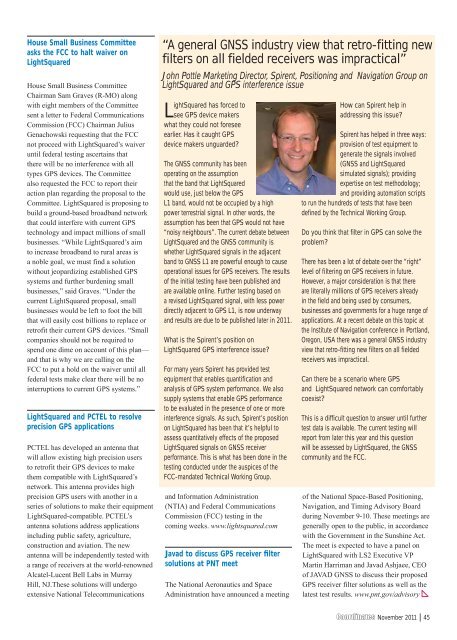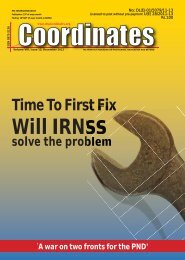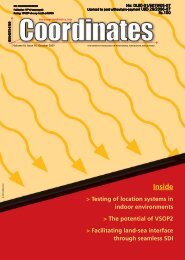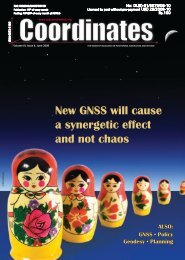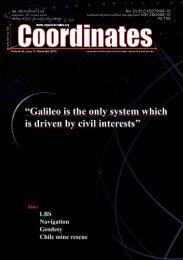Download - Coordinates
Download - Coordinates
Download - Coordinates
You also want an ePaper? Increase the reach of your titles
YUMPU automatically turns print PDFs into web optimized ePapers that Google loves.
House Small Business Committee<br />
asks the FCC to halt waiver on<br />
LightSquared<br />
House Small Business Committee<br />
Chairman Sam Graves (R-MO) along<br />
with eight members of the Committee<br />
sent a letter to Federal Communications<br />
Commission (FCC) Chairman Julius<br />
Genachowski requesting that the FCC<br />
not proceed with LightSquared’s waiver<br />
until federal testing ascertains that<br />
there will be no interference with all<br />
types GPS devices. The Committee<br />
also requested the FCC to report their<br />
action plan regarding the proposal to the<br />
Committee. LightSquared is proposing to<br />
build a ground-based broadband network<br />
that could interfere with current GPS<br />
technology and impact millions of small<br />
businesses. “While LightSquared’s aim<br />
to increase broadband to rural areas is<br />
a noble goal, we must find a solution<br />
without jeopardizing established GPS<br />
systems and further burdening small<br />
businesses,” said Graves. “Under the<br />
current LightSquared proposal, small<br />
businesses would be left to foot the bill<br />
that will easily cost billions to replace or<br />
retrofit their current GPS devices. “Small<br />
companies should not be required to<br />
spend one dime on account of this plan—<br />
and that is why we are calling on the<br />
FCC to put a hold on the waiver until all<br />
federal tests make clear there will be no<br />
interruptions to current GPS systems.”<br />
LightSquared and PCTEL to resolve<br />
precision GPS applications<br />
PCTEL has developed an antenna that<br />
will allow existing high precision users<br />
to retrofit their GPS devices to make<br />
them compatible with LightSquared’s<br />
network. This antenna provides high<br />
precision GPS users with another in a<br />
series of solutions to make their equipment<br />
LightSquared-compatible. PCTEL’s<br />
antenna solutions address applications<br />
including public safety, agriculture,<br />
construction and aviation. The new<br />
antenna will be independently tested with<br />
a range of receivers at the world-renowned<br />
Alcatel-Lucent Bell Labs in Murray<br />
Hill, NJ.These solutions will undergo<br />
extensive National Telecommunications<br />
“A general GNSS industry view that retro-fitting new<br />
filters on all fielded receivers was impractical”<br />
John Pottle Marketing Director, Spirent, Positioning and Navigation Group on<br />
LightSquared and GPS interference issue<br />
LightSquared has forced to<br />
see GPS device makers<br />
what they could not foresee<br />
earlier. Has it caught GPS<br />
device makers unguarded?<br />
The GNSS community has been<br />
operating on the assumption<br />
that the band that LightSquared<br />
would use, just below the GPS<br />
L1 band, would not be occupied by a high<br />
power terrestrial signal. In other words, the<br />
assumption has been that GPS would not have<br />
“noisy neighbours”. The current debate between<br />
LightSquared and the GNSS community is<br />
whether LightSquared signals in the adjacent<br />
band to GNSS L1 are powerful enough to cause<br />
operational issues for GPS receivers. The results<br />
of the initial testing have been published and<br />
are available online. Further testing based on<br />
a revised LightSquared signal, with less power<br />
directly adjacent to GPS L1, is now underway<br />
and results are due to be published later in 2011.<br />
What is the Spirent’s position on<br />
LightSquared GPS interference issue?<br />
For many years Spirent has provided test<br />
equipment that enables quantification and<br />
analysis of GPS system performance. We also<br />
supply systems that enable GPS performance<br />
to be evaluated in the presence of one or more<br />
interference signals. As such, Spirent’s position<br />
on LightSquared has been that it’s helpful to<br />
assess quantitatively effects of the proposed<br />
LightSquared signals on GNSS receiver<br />
performance. This is what has been done in the<br />
testing conducted under the auspices of the<br />
FCC-mandated Technical Working Group.<br />
and Information Administration<br />
(NTIA) and Federal Communications<br />
Commission (FCC) testing in the<br />
coming weeks. www.lightsquared.com<br />
Javad to discuss GPS receiver fi lter<br />
solutions at PNT meet<br />
The National Aeronautics and Space<br />
Administration have announced a meeting<br />
How can Spirent help in<br />
addressing this issue?<br />
Spirent has helped in three ways:<br />
provision of test equipment to<br />
generate the signals involved<br />
(GNSS and LightSquared<br />
simulated signals); providing<br />
expertise on test methodology;<br />
and providing automation scripts<br />
to run the hundreds of tests that have been<br />
defined by the Technical Working Group.<br />
Do you think that filter in GPS can solve the<br />
problem?<br />
There has been a lot of debate over the “right”<br />
level of filtering on GPS receivers in future.<br />
However, a major consideration is that there<br />
are literally millions of GPS receivers already<br />
in the field and being used by consumers,<br />
businesses and governments for a huge range of<br />
applications. At a recent debate on this topic at<br />
the Institute of Navigation conference in Portland,<br />
Oregon, USA there was a general GNSS industry<br />
view that retro-fitting new filters on all fielded<br />
receivers was impractical.<br />
Can there be a scenario where GPS<br />
and LightSquared network can comfortably<br />
coexist?<br />
This is a difficult question to answer until further<br />
test data is available. The current testing will<br />
report from later this year and this question<br />
will be assessed by LightSquared, the GNSS<br />
community and the FCC.<br />
of the National Space-Based Positioning,<br />
Navigation, and Timing Advisory Board<br />
during November 9-10. These meetings are<br />
generally open to the public, in accordance<br />
with the Government in the Sunshine Act.<br />
The meet is expected to have a panel on<br />
LightSquared with LS2 Executive VP<br />
Martin Harriman and Javad Ashjaee, CEO<br />
of JAVAD GNSS to discuss their proposed<br />
GPS receiver filter solutions as well as the<br />
latest test results. www.pnt.gov/advisory<br />
<strong>Coordinates</strong> November 2011 | 45


